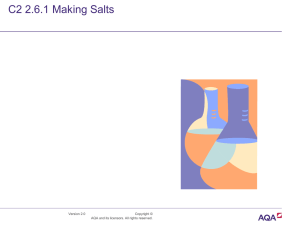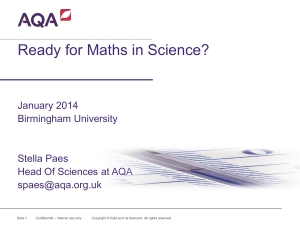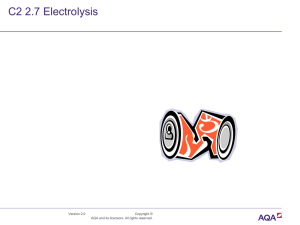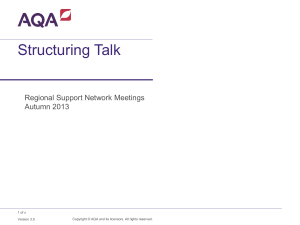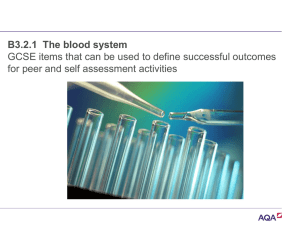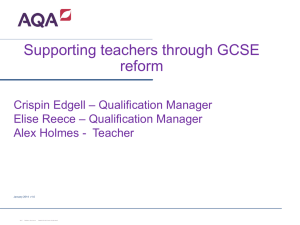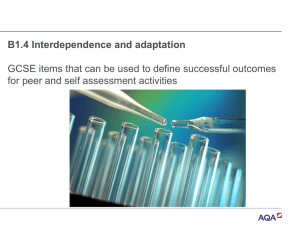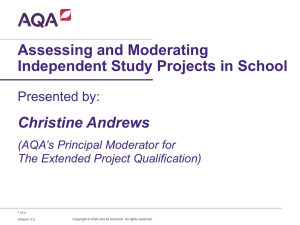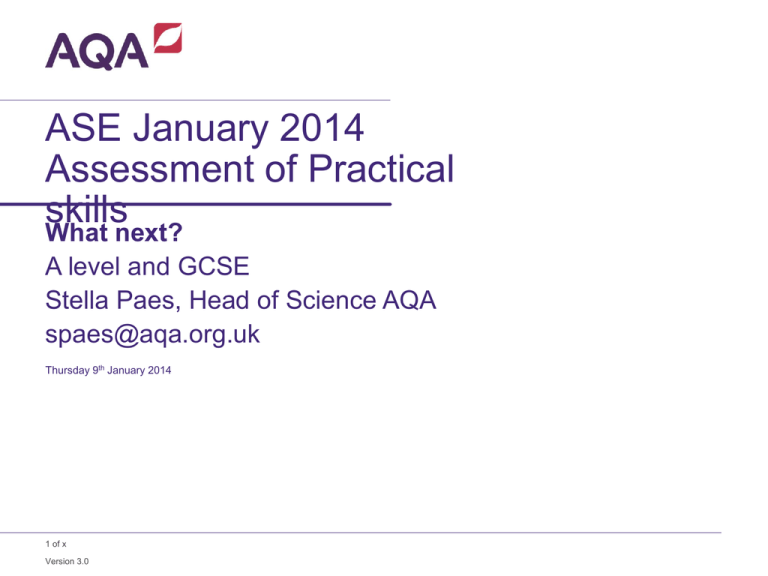
ASE January 2014
Assessment of Practical
skills
What next?
A level and GCSE
Stella Paes, Head of Science AQA
spaes@aqa.org.uk
Thursday 9th January 2014
1 of x
Version 3.0
Setting the context for practical assessment
Influences on policy change
•
•
•
•
•
•
•
Teachers
high stakes and cheating?
Higher education need fluency
Industry
need fluency and confidence to ‘think on feet ‘
Learned societies worried about decline in practical lessons
DfE listened to pressure groups
Ofqual malpractice and AQA influence
Ofsted values purposeful practical to stimulate curiosity.
2 of x
Copyright © AQA and its licensors. All rights reserved.
Maintaining curiosity in science: Ofsted
November 2013, No.
130135
•
•
For pupils to achieve well in science, they must not only acquire the
necessary knowledge, but also understand its value, enjoy the experience
of working scientifically, and sustain their interest in learning it. Pupils in
schools need to discover the concepts revealed through observing
scientific phenomena and conducting experimental investigations for
themselves. Then they are more likely to continue to study science and
use that learning for work, for family, and to contribute as informed citizens.
The report also reflects and explores the concerns often voiced by
employers, higher education, and the scientific community’s professional
bodies, that too many school leavers are not well-enough equipped
scientifically with practical, investigative and analytical skills. These
are vital if young people are to flourish in a technological world and to
contribute to economic development. The government’s review of GCSE
and A-level qualifications provides a timely opportunity to ensure that the
skills of scientific enquiry are assessed as an integral part of these
qualifications.
3 of x
Copyright © AQA and its licensors. All rights reserved.
Supplementary subject guidance for an Outstanding
judgement in Science Dec2013 Ofsted
Supplementary subject-specific guidance
Outstanding (1)
Pupils show exceptional independence; they are able to think for themselves and
raise their own questions about science knowledge, understanding and scientific
enquiry.
They are confident and competent in the full range of stage-related practical skills,
taking the initiative in planning, carrying out, recording and evaluating their own
scientific investigations.
Pupils frequently use their scientific knowledge and understanding very effectively
in written and verbal explanations, solving challenging problems and reporting
scientific findings formally. Appropriate control of several variables, and report
their findings clearly using accurate scientific language. (Good judgement)
They work constructively with other pupils, demonstrating common understanding
in discrete well-focused roles, with all playing a part in successful investigations.
Pupils show high levels of originality, imagination and innovation in their
understanding and application of their knowledge and skills.
Their practical work incorporates a variety of contexts, including fieldwork.
Pupils research contemporary issues and understand the impact of science on
society.
They develop a sense of passion and commitment to science, showing strong
application and enthusiasm to learn more through scientific endeavour.
Over time, the proportion of male and female pupils that progress to post-16
science studies is similar to the proportions nationally.
4 of x
Copyright © AQA and its licensors. All rights reserved.
Quality of curriculum grade descriptor
Outstanding provision =
• In secondary schools, sufficient time and high-quality practical resources to
teach science through practical investigation and illustration are provided,
with the result that students are motivated to study the subject further at 16
and 18.
• The non-statutory entitlement for all pupils with Key Stage 3 science
attainment at Level 6 and above that would benefit from the study of triple
science GCSEs is met.
5 of x
Copyright © AQA and its licensors. All rights reserved.
Why assess practical skills?
• Is it because being able to work practically is a fundamental skill set for a
scientist?
• Is it because working practically stimulates skills and processes that are
considered important?
• Is it to ensure that students get to do practical work?
• Is it to stop Heads from closing Prep Rooms and sacking Technicians?
• Is it because Ofsted judgements are based upon this!
6 of x
Version 3.0
Copyright © AQA and its licensors. All rights reserved.
Teaching and Learning Practical skills
•
•
Dual objectives with practical skills made explicit
More space in curriculum at KS4 for investigation
Three strands of practical performance
The practical capability of students can, broadly, be divided into three strands:
• Ability to follow instructions, use instrumentation, apparatus and materials
effectively and safely, observe, collect data and take measurements
• Ability to research, plan, carry out and report on an investigation
• Ability to analyse and evaluate procedures, data and conclusions.
7 of x
Copyright © AQA and its licensors. All rights reserved.
How to Assess Practical skills?
• indirect assessment in written papers of procedural
understanding, concepts of evidence and the
interpretations and evaluation of experimental
results
– Select apparatus to conduct a procedure?
– Recognise variability and unreliability?
– Report on an investigation effectively?
• direct assessment by teachers of practical
performance.
8 of x
Version 3.0
Copyright © AQA and its licensors. All rights reserved.
What competences can be assessed?
Possibilities when carrying out a
titration are;
• Can the candidate take an accurate
reading of the volume of liquid in a
burette?
• Can the candidate conduct a
titration?
• Does the candidate know when it is
appropriate to conduct a titration?
• Can the candidate interpret the
results from a titration and
recognise their significance?
Direct or indirect?
9 of x
Copyright © AQA and its licensors. All rights reserved.
Volumetric analysis
• Making up a standard solution
• Diluting a solution quantitatively
• Measuring the concentration of a solution by titration (acidbase and redox).
• Using a titration to determine a formula, or an equation, or to
answer some another chemical question
10 of x
Copyright © AQA and its licensors. All rights reserved.
Competences demonstrated
• Working out the quantities needed for a specified standard
solution/dilution/titration
• Selecting/justifying an appropriate sequence of stages to
gather the data needed to solve a given problem by titration.
• Explaining the accuracy and limitations of volumetric
instruments.
• Interpreting, by calculation, data from volumetric analyses to
answer chemical questions.
11 of x
Copyright © AQA and its licensors. All rights reserved.
Direct assessment by the teacher?
• Demonstrating correct technique when using volumetric
glassware.
• Making and recording measurements with appropriate
precision that give a result which is within an acceptable
range.
• Using class data to estimate uncertainty in results
12 of x
Copyright © AQA and its licensors. All rights reserved.
Past A level Chemistry question
13 of x
Copyright © AQA and its licensors. All rights reserved.
Apply the practical competences
1.Following instructions
Success in this element is described by:
the amount of support provided by the teacher or others, from almost working alongside the student to virtually no support at all beyond
issuing the instructions
the ability to translate instructions into practice and manage a sequence of steps, from little ability to working correctly through them
2. Using instrumentation, apparatus and materials
Success in this element is described by:
the amount of support provided by the teacher or others, from almost working alongside the student to virtually no support at all
the ability to manage techniques and procedures methodically in sequence and in combination, demonstrating skills, knowledge and
understanding in the techniques and procedures used
the quality of the outcome, from inadequate results to those that would be expected
3. Working safely
Success in this element is described by:
knowledge and understanding of hazards and hazard information, from that which is provided from instructions to independent
identification
the level of personal responsibility taken to remain safe, from an inconsistent to a consistent approach
4. Observing, measuring and recording
Success in this element is described by:
the ability to make observations and measurements, from those lacking in accuracy or detail to ones which are consistently accurate and
detailed
the quality of outcome of the experimental or investigative procedure, from limited results which would barely support an expected
conclusion to ones which would provide good evidence of support
5. Carrying out and reporting on investigative activities
Success in this element is described by:
the quality of investigative design and execution, from taking limited account of equipment choice and methodology to taking full account,
recognising the value of each part of the process and how it contributes to the whole
the ability to communicate the investigative procedure employed, from providing general outlines to describing full details such that the
investigative procedure is reproducible
14 of x
Copyright © AQA and its licensors. All rights reserved.
14
A Clear line of sight
Progressive development of skills
Mathematical
Practical
Enquiry
Written communication
GCSE
KS3
Tracking progress using the threads
Supports assessment for learning
15 of x
A
level
A tree model for thinking about learning in science
Progression in scientific observation skills
Progression in making meaning from scientific observations
Progression in evaluating scientific observations
These three cylinders stretch up inside the trunk
and are within every branch of science
Trunk = scientific body of
knowledge
16 of x
Version 2.0
Copyright © AQA and its
licensors. All rights reserved.
17 of x
Copyright © AQA and its licensors. All rights reserved.

